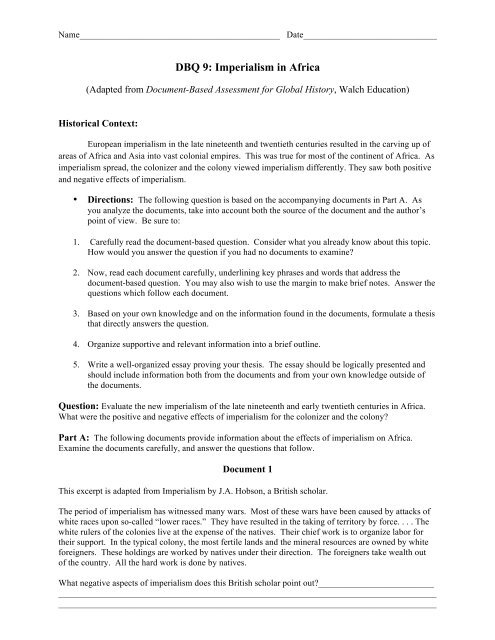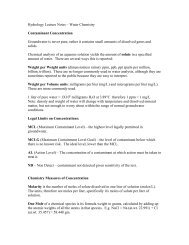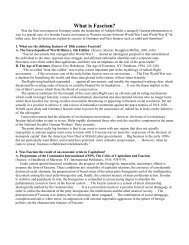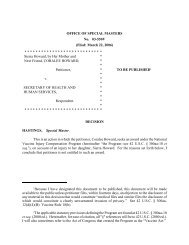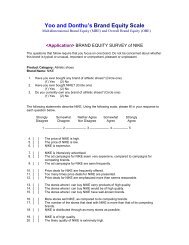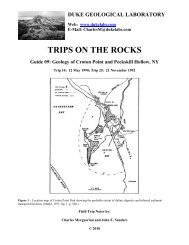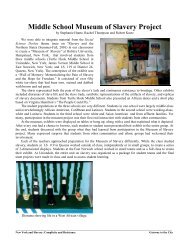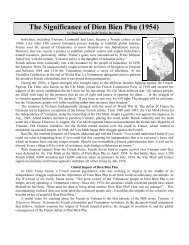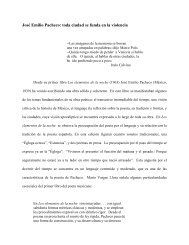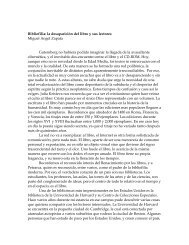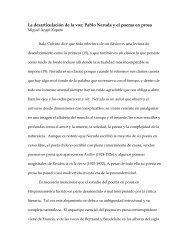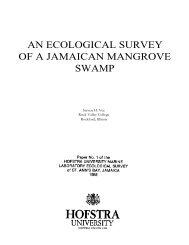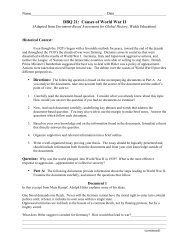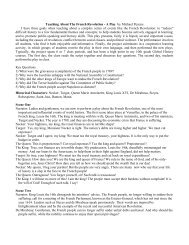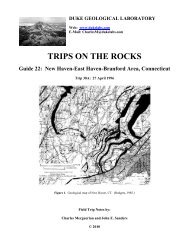DBQ 9: Imperialism in Africa - Hofstra People
DBQ 9: Imperialism in Africa - Hofstra People
DBQ 9: Imperialism in Africa - Hofstra People
You also want an ePaper? Increase the reach of your titles
YUMPU automatically turns print PDFs into web optimized ePapers that Google loves.
Name_____________________________________________ Date______________________________<br />
<strong>DBQ</strong> 9: <strong>Imperialism</strong> <strong>in</strong> <strong>Africa</strong><br />
(Adapted from Document-Based Assessment for Global History, Walch Education)<br />
Historical Context:<br />
European imperialism <strong>in</strong> the late n<strong>in</strong>eteenth and twentieth centuries resulted <strong>in</strong> the carv<strong>in</strong>g up of<br />
areas of <strong>Africa</strong> and Asia <strong>in</strong>to vast colonial empires. This was true for most of the cont<strong>in</strong>ent of <strong>Africa</strong>. As<br />
imperialism spread, the colonizer and the colony viewed imperialism differently. They saw both positive<br />
and negative effects of imperialism.<br />
• Directions: The follow<strong>in</strong>g question is based on the accompany<strong>in</strong>g documents <strong>in</strong> Part A. As<br />
you analyze the documents, take <strong>in</strong>to account both the source of the document and the author’s<br />
po<strong>in</strong>t of view. Be sure to:<br />
1. Carefully read the document-based question. Consider what you already know about this topic.<br />
How would you answer the question if you had no documents to exam<strong>in</strong>e?<br />
2. Now, read each document carefully, underl<strong>in</strong><strong>in</strong>g key phrases and words that address the<br />
document-based question. You may also wish to use the marg<strong>in</strong> to make brief notes. Answer the<br />
questions which follow each document.<br />
3. Based on your own knowledge and on the <strong>in</strong>formation found <strong>in</strong> the documents, formulate a thesis<br />
that directly answers the question.<br />
4. Organize supportive and relevant <strong>in</strong>formation <strong>in</strong>to a brief outl<strong>in</strong>e.<br />
5. Write a well-organized essay prov<strong>in</strong>g your thesis. The essay should be logically presented and<br />
should <strong>in</strong>clude <strong>in</strong>formation both from the documents and from your own knowledge outside of<br />
the documents.<br />
Question: Evaluate the new imperialism of the late n<strong>in</strong>eteenth and early twentieth centuries <strong>in</strong> <strong>Africa</strong>.<br />
What were the positive and negative effects of imperialism for the colonizer and the colony?<br />
Part A: The follow<strong>in</strong>g documents provide <strong>in</strong>formation about the effects of imperialism on <strong>Africa</strong>.<br />
Exam<strong>in</strong>e the documents carefully, and answer the questions that follow.<br />
Document 1<br />
This excerpt is adapted from <strong>Imperialism</strong> by J.A. Hobson, a British scholar.<br />
The period of imperialism has witnessed many wars. Most of these wars have been caused by attacks of<br />
white races upon so-called “lower races.” They have resulted <strong>in</strong> the tak<strong>in</strong>g of territory by force. . . . The<br />
white rulers of the colonies live at the expense of the natives. Their chief work is to organize labor for<br />
their support. In the typical colony, the most fertile lands and the m<strong>in</strong>eral resources are owned by white<br />
foreigners. These hold<strong>in</strong>gs are worked by natives under their direction. The foreigners take wealth out<br />
of the country. All the hard work is done by natives.<br />
What negative aspects of imperialism does this British scholar po<strong>in</strong>t out?__________________________<br />
_____________________________________________________________________________________<br />
_____________________________________________________________________________________
97<br />
(cont<strong>in</strong>ued)<br />
Name_____________________________________________ Date______________________________<br />
<strong>DBQ</strong> 18: <strong>Imperialism</strong> <strong>in</strong> <strong>Africa</strong>: An Evaluation (cont<strong>in</strong>ued)<br />
Document 2<br />
Sekou Toure, and <strong>Africa</strong>n nationalist, po<strong>in</strong>ted out another negative aspect of imperialism.<br />
Colonialism’s greatest misdeed was to have tried to strip us of our responsibility <strong>in</strong> conduct<strong>in</strong>g our own<br />
affairs and conv<strong>in</strong>ce us that our civilization was noth<strong>in</strong>g less than savagery, thus giv<strong>in</strong>g us complexes<br />
which led to our be<strong>in</strong>g branded as irresponsible and lack<strong>in</strong>g <strong>in</strong> self-confidence.<br />
What criticism of imperialism does this <strong>Africa</strong>n offer?_________________________________________<br />
_____________________________________________________________________________________<br />
Document 3<br />
The resolution of the All-<strong>Africa</strong>n <strong>People</strong>’s Conference, held <strong>in</strong> Accra, Ghana <strong>in</strong> 1958, “condemns<br />
colonialism and imperialism” based on these premises.<br />
Whereas all <strong>Africa</strong>n peoples . . . deplore the economic exploitation of <strong>Africa</strong>n people by Imperialist<br />
Countries, thus reduc<strong>in</strong>g <strong>Africa</strong>ns to poverty <strong>in</strong> the midst of plenty . . . Whereas fundamental human<br />
rights, freedom of speech, freedom of association, freedom of movement, freedom of worship, freedom to<br />
live a full and abundant life . . . are denied to <strong>Africa</strong>ns through the activities of Imperialists.<br />
What are the reasons this group condemned imperialism?_______________________________________<br />
_____________________________________________________________________________________<br />
Document 4<br />
George H.T. Kimble, <strong>in</strong> a 1962 New York Times Magaz<strong>in</strong>e article, “Colonialism: the Good, the Bad,<br />
the Lessons,” gives his po<strong>in</strong>t of view.<br />
. . . they [the colonial powers] failed to provide the <strong>Africa</strong>n with sufficient [preparation] . . . None of the<br />
newly <strong>in</strong>dependent countries had enough skilled <strong>Africa</strong>n adm<strong>in</strong>istrators to run their own . . . [or] enough<br />
<strong>Africa</strong>n technicians to keep the public utilities work<strong>in</strong>g. . . . And no country had an electorate that knew<br />
what <strong>in</strong>dependence was all about. . . . For all its faults, colonial government provided security of person<br />
and property <strong>in</strong> lands that had known little or either. . . . It was the colonial powers who were largely<br />
responsible for the open<strong>in</strong>g of the region to the lumberman, m<strong>in</strong>er, planter, and other men of means<br />
without whom its wealth would be cont<strong>in</strong>ued to lie fallow [uncultivated].<br />
What does this author cite as negative effects of imperialism?___________________________________<br />
_____________________________________________________________________________________<br />
What does he cite as positive effects of imperialism?__________________________________________<br />
____________________________________________________________________________________<br />
(cont<strong>in</strong>ued)
98<br />
Name________________________________________________ Date___________________________<br />
This is an <strong>Africa</strong>n proverb.<br />
<strong>DBQ</strong> 18: <strong>Imperialism</strong> <strong>in</strong> <strong>Africa</strong>: An Evaluation (cont<strong>in</strong>ued)<br />
Document 5<br />
When the whites came to our country, we had the land and they had the Bible; now we have the Bible and<br />
they have the land.<br />
What does this proverb imply about the effect of imperialism <strong>in</strong> <strong>Africa</strong>?___________________________<br />
_____________________________________________________________________________________<br />
Document 6<br />
This poem by David Diop is from an Anthology of West <strong>Africa</strong>n Verse.<br />
The White Man killed my father, My brother was strong.<br />
My father was proud. His hand red with black blood<br />
The White Man seduced my mother, The White Man turned to me;<br />
My mother was beautiful. And <strong>in</strong> the Conqueror’s voice said,<br />
The White Man burnt my brother “Boy! A chair, a napk<strong>in</strong>, a dr<strong>in</strong>k.”<br />
Beneath the noonday sun,<br />
What negative aspects of imperialism does David Diop present <strong>in</strong> this poem?_______________________<br />
_____________________________________________________________________________________<br />
Document 7<br />
This excerpt, adapted from Balance Sheets of <strong>Imperialism</strong> by Grover Clark, po<strong>in</strong>ts out other negative<br />
aspects of imperialism.<br />
The struggle for colonies does not result only <strong>in</strong> cash losses. There were also lives lost, wars fought, and<br />
hatreds aroused which threatened new wars. . . .Italy’s trade with her colonies <strong>in</strong> 1894-1932 was worth<br />
5,561 million lire [about $1,100 million]. This was less than one percent of her total foreign trade <strong>in</strong> the<br />
same period. In fact, her expenditures on colonies for that time was 6,856 million lire. Obviously<br />
colonies cost more than they are worth <strong>in</strong> trade.<br />
What evidence does this author provide to show that colonies were a negative f<strong>in</strong>ancial dra<strong>in</strong> on the<br />
Europeans?___________________________________________________________________________<br />
_____________________________________________________________________________________<br />
• Part B—Essay<br />
Evaluate the new imperialism of the late n<strong>in</strong>eteenth and early twentieth centuries <strong>in</strong> <strong>Africa</strong>.<br />
What were the positive and negative effects of imperialism for the colonizer and the colony?
99<br />
Grad<strong>in</strong>g Key Teacher Guide Page<br />
Document 1<br />
Hobson po<strong>in</strong>ts out the negative aspects of imperialism. There were many wars as the white races<br />
took over the territory of the “lower races” by force. The whites also took the most fertile land, the<br />
m<strong>in</strong>es, and used the people for labor. The foreigners took the wealth out of the country.<br />
Document 2<br />
Toure believed that imperialism had a negative effect on <strong>Africa</strong>ns. They had no responsibility for<br />
their government and became conv<strong>in</strong>ced that they were <strong>in</strong>ferior. As a result, their self-confidence was<br />
lack<strong>in</strong>g.<br />
Document 3<br />
The All-<strong>Africa</strong>n <strong>People</strong>’s Conference opposed imperialism <strong>in</strong> its declaration. They stated that<br />
imperialism should be condemned because it exploited <strong>Africa</strong>n people and let to poverty <strong>in</strong> <strong>Africa</strong>. Also,<br />
the <strong>Africa</strong>ns had no freedom of speech, movement, worship, or association.<br />
Document 4<br />
This writer suggested that colonial people were not prepared for self-government and for runn<strong>in</strong>g<br />
the <strong>in</strong>dustries of their countries. On the positive side, the Europeans provided the <strong>Africa</strong>ns with<br />
protection. The colonial powers also opened up the resources of <strong>Africa</strong> that the <strong>Africa</strong>ns lacked the<br />
money to develop. This author saw positive and negative effects for the colony.<br />
Document 5<br />
The proverb suggests that the <strong>Africa</strong>ns lost their land to the whites. The <strong>Africa</strong>ns got a new<br />
religion, Christianity, <strong>in</strong> return. It implies that the <strong>Africa</strong>ns lost more than they ga<strong>in</strong>ed.<br />
Document 6<br />
This poem lists all that was taken from the <strong>Africa</strong>n by the white man—lives, labor, and pride.<br />
The <strong>Africa</strong>n was treated like a child.<br />
Document 7<br />
The author po<strong>in</strong>ts out that imperialism was expensive for the colonizer. The European countries<br />
lost money and lives <strong>in</strong> the wars fought over colonial claims. These expenditures exceeded the trade<br />
benefits for European countries such as Italy.<br />
Additional Information Beyond the Documents<br />
The documents provide students with only fragments of evidence. Answers should <strong>in</strong>clude<br />
relevant <strong>in</strong>formation from beyond the documents—<strong>in</strong>formation that students have learned from their<br />
classroom study. The follow<strong>in</strong>g list suggests some of the <strong>in</strong>formation that students might <strong>in</strong>clude <strong>in</strong> their<br />
essays from outside learn<strong>in</strong>g.<br />
Maps of <strong>Africa</strong><br />
<strong>Africa</strong>n conditions under European rule
100


